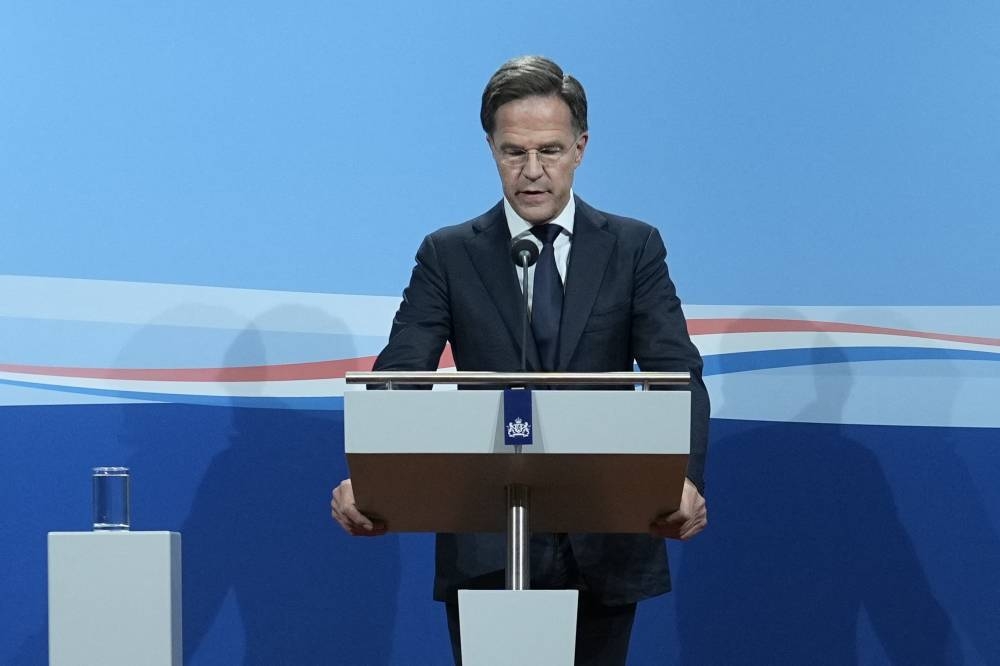Dutch Prime Minister Mark Rutte said Friday his coalition government was resigning over "insurmountable" differences about measures to curb migration.
Rutte, 56, the Netherlands' longest-serving leader, chaired days of crisis talks between the four coalition parties but they were unable to reach a deal.
The Netherlands is expected to hold elections in November following the fall of the coalition, which is Rutte's fourth since 2010 and had only taken office in January 2022 after lengthy negotiations.
"This evening we have unfortunately reached the conclusion that the differences are insurmountable," Rutte, the leader of the centre-right VVD party, told a press conference.
"For this reason, I will shortly present my written resignation to the king in the name of the whole government."
Rutte added that he had the "energy" to stand for a fifth term but that he had to "reflect" first.
Europe's second longest-serving leader after Hungary's Viktor Orban had wanted to tighten curbs on reuniting families of asylum seekers, following a scandal last year about overcrowded migration centres in the Netherlands.
Local media said Rutte -- dubbed "Teflon Mark" after the non-stick pan coating for his political slipperiness -- had taken a tough stance on migration to deflect a challenge from the right-wing of his party.
He reportedly demanded that the number of relatives of war refugees allowed into the Netherlands be capped at 200 per month, and threatened to topple the government if the measure did not pass.
The coalition -- which local media said was "not a happy marriage" -- last year faced a major scandal over overcrowded migration centres in which a baby died and hundreds of people were forced to sleep in the open.
Rutte had promised a "structural solution" to the problem after what he called "shameful scenes" at the asylum centres.
But the Christen Unie -- a Christian Democratic party that draws its main support from the staunchly Protestant "Bible Belt" in the central Netherlands -- strongly opposed the plan to cap refugee family member numbers.
After three days of talks, a compromise on a so-called "emergency button" -- that would have only triggered the restrictions in case of large migrant numbers -- was not enough to reach a deal on Friday.
A crowd of onlookers began to gather outside the government buildings where the talks took place in the historic centre of The Hague, an AFP reporter said.
"I'm quite concerned. I'm worried what the next cabinet is going to look like," said 19-year-old IT worker Marijn Philippo.
"I hope that the next cabinet will do better than this one, especially in terms of asylum," added Pieter Balkenende, 32.
Rutte has long been under pressure on the issue of migration due to the strength of far-right parties in the Netherlands, including that of anti-Islam leader Geert Wilders.
And elections promise to be stormy, after an upstart party led by farmers against the government's European Union-backed environmental rules won the most seats in senate elections earlier this year.
Rutte's backroom political skills have seen him navigate his way to the top of four successive coalition governments -- but he has had several close escapes.
His previous government was forced to resign en masse in 2021 over a child benefits scandal that largely targeted ethnic minority families.
In 2017 he was widely criticised for tacking to the right ahead of elections in a bid to keep Wilders out of power, at a time when populist parties were surging in the wake of the 2016 Brexit vote and election of Donald Trump.

Prime Minister Mark Rutte delivers a press conference following a cabinet meeting after the collapse of the Rutte IV cabinet in The Hague. Phil Nijhuis / ANP / AFP
